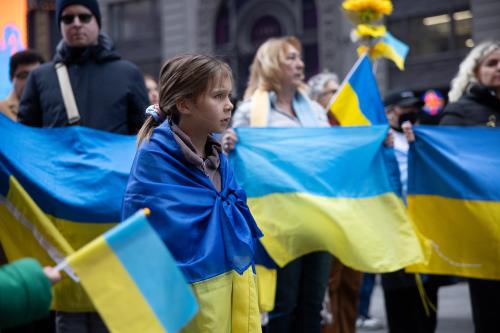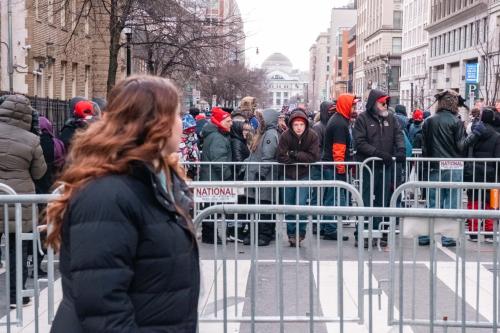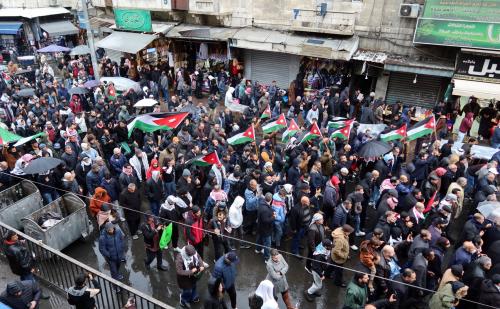Both Hamas and the Israeli government have dramatically escalated tensions that began as spontaneous grassroots protests over the eviction of Palestinian families in East Jerusalem to military violence with a high cost to civilians in both Israel and Gaza. Shibley Telhami weighs in on the confrontations spreading throughout Israel and the Palestinian territories, and whether the Biden administration will be able to effectively call for calm in the region.
Related material:
- Hamas tries to seize the day
- Biden says he will listen to experts. Here is what scholars of the Middle East think.
Listen to Brookings podcasts here, on Apple or on Google podcasts, send email feedback to [email protected], and follow us at @policypodcasts on Twitter.
Thanks to audio producer Gaston Reboredo, Chris McKenna, Fred Dews, Marie Wilken, and Camilo Ramirez for their support.
TRANSCRIPT
PITA: A dramatic escalation in violence in Israel and the Palestinian territories over the last several days as what began as protests over the eviction of Palestinian families from their homes in East Jerusalem and Israeli police violence at the al-Aqsa mosque in Jerusalem has turned into a barrage of rocket fire from Gaza followed by retaliatory bombing by Israeli warplanes, many striking residential towers.
With us to discuss what’s happening in Israel and the Palestinian territories is Shibley Telhami, a nonresident senior fellow with the Center for Middle East Policy here at Brookings and Anwar Sadat professor for peace and development at the University of Maryland. Shibley, thank you for being here and talking to us today.
TELHAMI: My pleasure.
PITA: So, we are looking at current counts, as of today, over 50 dead in Gaza, hundreds wounded and many left homeless; there are six Israelis dead I believe, with over 1000 rockets fired out of Gaza. How did this escalate so quickly from these localized protests in East Jerusalem to full-scale bombings now?
TELHAMI: Well, I think there are two reasons for it, one reason is the timing. It came at a time when there was total despair among Palestinians. The international community has not pushed for anything to end the conflict. The Biden administration, where the Palestinians placed a lot of hope after Trump, had done some things like renewing aid, but certainly it wasn’t a priority issue for them. And then even on the ground where there was a lot of energy toward planned Palestinian elections at least to create new dynamism in the Palestinian areas, that was postponed and sapped a lot of energy.
So, there was a lot of despair on the ground that this captured, and because the issues that were involved were so core issues, that is, the eviction issue, is reminiscent of 1948 when people were forcibly removed from their homes. This plus the Jerusalem issue and the al-Aqsa mosque, which is obviously critically important to Palestinians, but also to Arabs and Muslims broadly and the assault on the mosque — all of these have galvanized the Palestinians in ways we have not seen in the past; I mean, in the past few years.
This is a new dynamism about mobilization, galvanization, that is reminiscent in some ways to the start of the intifada in 1987-88, when, in fact, the Palestinians also were somewhat in despair because the Arabs were preoccupied during that decade with the Iran-Iraq; very few people were paying attention to Palestine and the PLO was really in exile in Tunis away from the West Bank and Gaza, when the Palestinians took things into their own hands.
So, the timing of this is and the issues involved were particularly important on the Palestinian side, but add to this that there is a significant provocation taking place, certainly by the Israeli right. People who see this as an opportunity to not only implement a plan to make Jerusalem more Jewish and less Arab — this has been obviously something that the deputy prime minister of Israel talked about as a long term sustained effort to keep Palestinians out and bring in more Jews into the city, something that obviously has been critical in the way that Palestinians feel about this issue. And second, that the prime minister of Israel, whatever his role was — that is, Benjamin Netanyahu — clearly had an interest in the escalation. The Israeli press is saying, obviously, that the police acted like they were provoking rather than trying to end the confrontations, particularly in the behavior in the assault on the mosque. And there’s no question, whatever role the prime minister played, no question that he benefits. He benefits not simply because he distracts from his political and legal troubles in Israel, but he benefits, because he actually has prevented, so far, what looked like an imminent government formed by coalition of his opponents, because that government would have dependent on the support of one of the Arab parties and now Arab parties in this environment of total confrontation and conflict just simply cannot bring itself to support a government that has many right-wingers in it. And so, in that sense, the prime minister has been a political winner. I’m not sure that he wanted an all-out war, but he benefited from the initial escalation.
On the Palestinian side, Hamas had something to benefit — actually quite a lot to benefit from the escalation, in part, because they had been marginalized. They’d obviously not had much of an impact on what’s happening in Gaza and the West Bank and they were hoping that they would do well in the elections, and they were expected to do well in the elections in May, but those had been postponed. And yet there was like a sense among the public that Hamas could have done better. And so here in this particular opportunity, where the Palestinian Authority, particularly the president of the Palestinian Authority, Mahmoud Abbas, seem helpless. There’s nothing really they can do. There’s very few levers at their disposal to affect the events, because the young people who are carrying out the protests are really out of his control; he lost legitimacy with them. And they are not speaking either for him or for Hamas. This appears to be at the core a spontaneous grassroot protest, obviously with political parties trying to take advantage of it, whether it’s Hamas or Fatah.
But Hamas sees a great opportunity here because they’re the ones who are acting in a way that impacts the conflict and inflicts pain on the Israelis. So that has been clearly, to the extent that they were beneficiaries, both sides have some interest in escalation, that is the right-wing government in Israel and Hamas had some interest in escalation. But I don’t think either one wanted to see an all-out war. And the problem, of course, is when you escalate you can’t control it and we’re seeing here things going very much out of control.
And we also are seeing something that we haven’t seen in a long time, which is the spread of what’s happening in East Jerusalem and the West Bank into Israel itself, with Israeli citizens, with Palestinians confronting police, but also, unfortunately, in confrontation with Jews in many cities in a way that could be truly troubling beyond the Palestinian issue as such but inside Israel itself.
PITA: Thanks, Shibley. I want to ask you this escalation factor. Given the spread of unrest across many other towns and cities throughout Israel and the West Bank, that this isn’t just a question of localized violence, and that we’re seeing a level of violence that we haven’t seen in several years – how likely is it that both sides may find a way to de-escalate, to walk back from these rounds of retaliatory exchanges?
TELHAMI: Well, again, I think that everybody needs a fig leaf and everybody needs a party to provide the fig leaf. I think at this point they’re not looking for a fig leaf, because the emotions are raw and the casualties are real and they’re increasing. And particularly the Israeli killing of Hamas commanders, I’m sure means that Hamas, to the extent that it may have been prepared to engage quickly in a cease-fire, is just going to move on a little bit more longer, and I think you find the same kind of sense on the Israeli side.
So, no one really can control it, but at some point, obviously, there is no party that can win this one, in whatever “win” means strategically. I mean, obviously, the Palestinians always pay a heavier price. The asymmetry of power is so overwhelming in favor of Israel. Then, no matter what happens, the ratio of casualties already you see, you know, it’s like 10 to one just in the dead area, and the wounded it’s also kind of similar numbers, if not more. So, of course, not to mention the total destruction on the on the Palestinian side. The graphic view of an over 13-story building coming down versus a hole in a wall or roof damage from a much less potent rocket coming from Gaza; obviously, there’s a huge asymmetry of power. But still, Israelis hurt. I mean the fact that you have six people killed so far, that’s a lot of people if you have people wounded. That doesn’t of course capture the psychological environment where people are sleeping in shelters. On the Palestinian side, of course, it’s much more devastating. And that happens in Gaza, where the infrastructure is terrible, where they’re already dealing with multiple compounded crises, where it’s hard to deal with it.
So, at some point, someone wants to end this — and there is no, you know you can go for 50 days as they’ve done in the past or more — but there was no end in sight that would transform the conflict. There was no such thing. And so, the question is who’s going to weigh in with the parties, to provide them with some fig leaf to end this, for now. And I think that there is on the Arab side, obviously, there is the Egyptians and the partners who have probably the most influence with Hamas. And with Israel, no one has more leverage than the than the United States. And the Biden administration, obviously, has been working this behind the scenes around the clock, trying to help in multiple ways on a smaller scale to de-escalate, but frankly at the level of public posture, they have not done well. They have not met the moment. They have not met the moment and part of this is that they were taken by surprise by the events.
This was not a priority issue for the Biden administration — understandably wasn’t a priority issue for the administration, given all the stuff — whether it’s the pandemic the economy, racial issues and beyond that he has to deal with — and even on the Middle East, he was focused more on the Iran nuclear deal over which he faced Israeli opposition, and he certainly didn’t want to open another front of confrontation with Israelis over Israel-Palestine, thinking that’s not a high priority issue. But it is now, and they have not performed well in terms of the public posture, particularly with regard to the evictions.
The evictions are not something like you call on both sides to de-escalate; the evictions are wrong. They evictions are against international law. The evictions were called by the U.N. a war crime. The evictions were called by the E.U. a blatant violation of international law. The president of the United States wants to take the U.S. on a course of advocacy, of human rights and democracy to contrast with the Trump administration. He wants to lead; he wants to lead the way on human rights and democracy, and you don’t take this position over an act that was immoral to start with, but beyond the morality issue that it was so blatantly against international law. And so I think that’s the question for the Biden administration: will they, if they can’t even go out and make a statement on something so clear cut for the international community and measured against international principles, can they really weigh in politically in a manner that makes a difference in the relationship with Israel, to weigh in to call for calm in an effective way?
PITA: Alright, Shibley, thank you so much for talking to us today and explaining what’s going on. And we’ll of course we’ll wait and hope that both sides are able to back down in this instance.
TELHAMI: Yeah, I hope so, because obviously the cost, the human cost, which we should never lose sight of, whether it’s Palestinians or Israelis, the innocent people who are not only dying and being wounded, but also people whose lives are disrupted in a big way. I think that’s a starting point for all of us to hope that this will come to an end soon.
PITA: Absolutely. Thank you, Shibley.
TELHAMI: My pleasure.
The Brookings Institution is committed to quality, independence, and impact.
We are supported by a diverse array of funders. In line with our values and policies, each Brookings publication represents the sole views of its author(s).







Commentary
PodcastWhat hope is there for de-escalation between Israel and Hamas?
May 12, 2021
Listen on
The Current Podcast